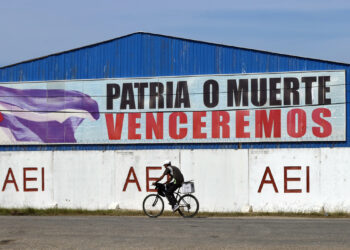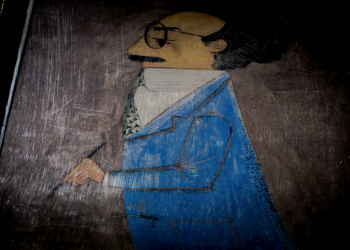Esteban is Jonal Cosculluela´s debut film. It is an intimate drama about a ten year old boy who casually discovers his musical talent and falls for the piano. It is a story of possible impossible that addresses the protagonist’s perseverance and determination to achieve his dreams.
Esteban ‘s story is a simple one that could well be the story of the childhood of one of our great musicians. The ninety minutes long film, co-produced by the Cuban Institute of Music and RTV Commercial and under the auspices of Hermanos Saiz Association (AHS by its Spanish acronym), will be seen very soon, as its team is already finishing the sound postproduction phase .
OnCuba talked to Cosculluela, its director, to approach this encouraging film.
How did the idea for this film emerge?
I was given the script from Amilcar Salati, a television writer to make a TV short. At first everything would be for television. The idea of taking it to the cinema was by Vilma Montesinos, who belongs to the Cuban Film Institute (ICRT by its Spanish acronym). She found by accident the script misplaced with others of a series that we were going to do and she liked to turn it into a movie.
Then we started working on this for three years seeking funding. It was very difficult to get the budget for the film because it is one of the few contemporary films that lacks sex, adult language and violence, so it can be appreciated by all audiences and to achieve this we had to knock a lot of doors. The film was very lucky because all fell in love with it by the sensitivity of the issue it addresses. Once we had the money we needed to shoot, which was not a huge budget, but rather modest, we started working on the script. As the text was for television we had to convert it to cinema. Although the boundaries between both media become increasingly blurred, there are still certain codes that distinguish them. Each has its specificities, time, photography and the way to provide information to viewers is different.
What is the story about?
If I had to sum up the film in a sentence I would do it through a popular phrase: “I did not know it was impossible and so I did it.” It is a story about dreams, about not quitting, about doing every day something to achieve your goals. I do not believe in obstacles but in perseverance. The film tells how the dream of becoming a pianist of this child was carried out even though his mother was against it.
In today’s Cuba there are many shortcomings and difficulties, so piano lessons are very expensive and parents want their children to be engaged in something more practical that provides profits in an immediate way, something perhaps as gastronomy. The mental limitations of the mother did not allow her to appreciate the talent of her child and seeing a prosperous future in his career as a musician. This story is about not losing the longings and processes to achieve them. It is a hymn to professional accomplishment, to vocation because accomplished people always have a smile on their face and something to contribute, unlike frustrated ones. Not abandoning dreams though seeming impossible, that’s the most important.
How was the selection and work with the actors?
Manuel Porto is the piano teacher, Yuliet Cruz is the mother of the child, the professor’s daughter is Monica Alonso, while Ismael Isaac is the father, the latter were living abroad and I was lucky to have them. Finding the child was quite a challenge, a black child, between eight and ten years who played piano and who was not an actor was complex to find. The chosen one was Reynaldo Guanche . We found him thanks to AHS. We made a very large casting and I liked this boy since I made him the first interview. In the end we picked five children and inserted them into an acting workshop because we had to prepare them, as there was a huge risk that everything went wrong, because much of the plot falls in that character. This child for me is a hero. He had no vacation, he was with us all the time, training the musical theme composed by Chucho Valdes, which I even asked him to make it in the simplest possible way, because the child should play it on scene, the work of this master is always complex. We become Reynaldo part of our family because we had him almost all the time.
It is said that directing children is one of the biggest challenges a director faces. How did you take on the challenge?
The first thing I asked myself was to develop a good personal relationship with the child before him to delve into the character and then continue to support him at all. Another strategy that I set myself was to seek for enshrined actors with a solid career for the level of performance of the film to be kept high. This helped me to devote myself to work on the child’s performance without having to push myself too much with the other more experienced actors; rather finding that the essence of the scene to be focused on he to had the feeling required by each sequence, that was my intention. Sometimes he was free to improvise whenever there was coherence.
Viva Cuba , La Edad de la Peseta, Conducta, and Sin embargo… are some recent films featuring children. Depending on the genre and specificities of your story, how do you think the film is inserted into this recent trend of Cuban cinema?
It can have points in contact with many of Cuban films that preceded it, especially dramas. It has film references which are consistent in raising sensations, passions, feelings and call for reflection.
It also has many literary references because from Sophocles, Euripides and Aeschylus there is nothing new here, what is new is the way to do , how to tell the story and staging. We work with a different type of photograph that we know is being handled in the current Cuban cinema, staging is also diverse. It is an unpretentious film, a melodrama with a hopeful ending and a very nice message and it is really easy getting identified with this work.
What would you highlight from the film?
The performances, no doubt. All actors were very good. The child was a revelation and Yuliet´s performance is memorable. She played the character in a masterly manner, sometimes I did not know if I was talking to Yuliet or Miriam. She went great on her skin, she is a mother in real life and her personal experiences contributed to this construction.
She also caught the character because she found much in contact with her own mother and from there she took it. Porto is one of the best Cuban actors from this time; he was identified with the character despite never having played any similar one during his career. He told me when I called him, “You have to be crazy to propose me a music teacher because I do not play any instrument at all and I’ve never sung” . He identified with the character and that’s what’s important. We made him to take piano lessons and discovered he had talent and that he can even sing. He is now doing a novel in which he sings, so what he learned in this production served him for his career.
How did you manage to add Chucho Valdés to the project?
As Esteban I am a person who is always dreaming and I have a producer, Maritza Ceballos, who is amazing. I dream and dream and she takes care of landing me and telling me which are our real possibilities. One day during a Habano Festival I told her: I wish Chucho to do the music of the movie. Immediately she got up and went to talk to him and spoke him about the project. We agreed to meet each other at his house, I took the script and he loved the project and said he wanted to be part of it. When he entered more doors got even opened and his presence is a plus when distributing the film because I’m practically a stranger in the country and it is wonderful when reading in the credits that the music is entirety composed and performed by this great master. It was quite an honor. He delved into the story and made it his.











Agradecemos el interés de On Cuba en el cine cubano, pero por favor rogamos que rectifiquen el articulo pues la foto de portada no se corresponde con la pelicula “Esteban”. Saludos, Maritza Ceballo, Productora del filme
Gracias a Oncuba por contar con nosotros para esta edición. Jonal Cosculluela
Cuando Se puede ver la pelicula